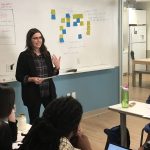Building Cultures of Collaboration
Coro helps organizations and institutions build a collaborative culture and develop collaborative leaders.
Leadership Collaboratives
Collaboration requires more than bringing diverse points of view to the same room. It requires trust, shared language, and enduring relationships that engage differences of opinion. Coro’s leadership collaboratives equip participants with the skills, knowledge, and networks to collaborate across difference.
In 2006, Coro created Leadership Collaborative as a part-time leadership development program. Since then, we have partnered with many organizations and institutions—including the University of California Office of the President, University of California San Francisco, University of California Davis, Point Blue, the City of Fremont, AT&T California, the San Francisco Federal Executive Board, the National Human Trafficking Training and Technical Assistance Center, and more—to deliver customized, cohort-based, part-time leadership development experiences focused on specific issues and/or populations.
Key Program Leadership Competencies
- Increase self-awareness
- Employ a “growth mindset”
- Use and understand different leadership styles
- Build trust-based relationships
- Improve group process and dynamics
- Utilize inquiry as a leadership tool
- Lead effective meetings
- Balance inquiry and advocacy
- Improve listening and coaching
- Give and receive feedback
- Present persuasively
- Mutual-gains negotiation
- Navigate difficult conversations
A recent longitudinal study of Leadership Collaborative participants conducted by the University of California San Francisco found the following program impact:
For the individual:
93% are more confident in leading/managing in challenging times.
81% are more confident in handling leadership responsibilities.
78% are more effective in leadership roles.
63% sought out new leadership opportunities.
On an interpersonal level:
90% have stronger interpersonal skills.
85% say the Collaborative helped them with network building across traditional boundaries.
67% have a better understanding of group dynamics.
For the organization:
92% of participants gained a better understanding of their institution.
79% had increased confidence in navigating their institution.
60% were encouraged to expand their leadership role.
Program fees vary, depending on scope of program and activities.

